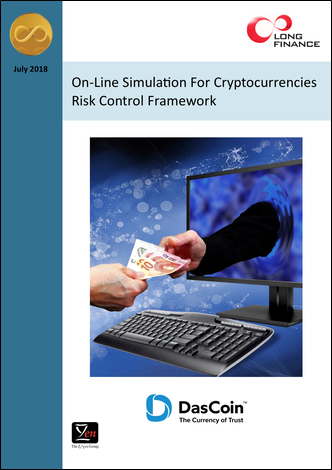Authors
Matthew Leitch and Aleksandar Matanovic
Sponsored by
- Dascoin
Published by
Long Finance (July 2018), 91 pages.
Share on social media:



You might also be interested in:
On-line Simulation For Cryptocurrencies: Risk Control Framework
Long Finance's Eternal Coin research programme has produced this report entitled “On-line Simulation For Cryptocurrencies: Risk Control Framework”.
Cryptocurrency development has been an exciting area for several years, with many new ideas coming forward and still the potential of a new launch that solves the biggest technical and commercial challenges. However, to date, almost all the 1,500+ cryptocurrencies that have been launched have died away, and even Bitcoin has serious technical limitations that have prevented it from being a competitive payment system in most situations. Cryptocurrencies have been seriously impacted by technical problems, disagreements, fraud, hacks, competition, regulation, lack of popularity, apathy, and sheer incompetence.
To increase the odds of success, those who aspire to a successful cryptocurrency need to think through the challenges they may face, make plans, make design choices, and develop capabilities that help them survive. They need control frameworks, practices, and procedures to create business value and minimise risk. While boring, intellectually these are tough and need to respond to the special characteristics of cryptocurrencies. This report looks at the control needs of cryptocurrencies mainly from the perspective of their creators and regulators (such as they are so far). The objective is to make recommendations on controls for cryptocurrencies that are not too prescriptive, but more helpful than generic control frameworks such as COSO’s frameworks for internal control and enterprise risk management (Committee of Sponsoring Organizations of the Treadway Commission 2013, 2017), and variations on them (e.g. Basel Committee on Banking Regulation 1998, Financial Reporting Council 2014).
This initial report complements previous Long Finance work on governance, audit, and standards for smart ledger systems. It also reflects the focus of the Eternal Coin research programme, a global discussion on the nature of money and the concept of value over the long term.”




